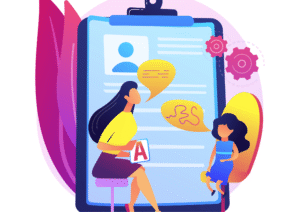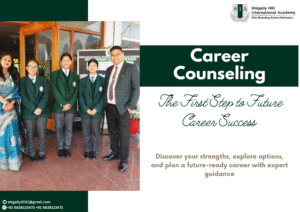Regardless of whether a student attends college in a metro city, a small town, or one of the leading girls boarding schools in India, there is one shared concern—what to study and how to reach there. For both students and parents, the road to a successful tomorrow is riddled with questions, doubt, and sometimes differing opinions. With emerging industries and time-honored professions changing, career counseling serves as a vital tool to guide students in making informed choices. It offers a systematic way of knowing oneself and uncovering possibilities, thus making career planning a more confident and informed process.
The Changing Career Landscape

Globalization and Technology
Work itself has changed dramatically. New technologies like artificial intelligence, blockchain, and robotics have revolutionized industries. Never before were job opportunities so widely available around the globe, but they are also fraught with fierce competition. A large number of jobs that existed before are vanishing, while others that didn’t even exist a decade ago are in heavy demand. Career guidance keeps students abreast of all these developments and makes them aware of careers that are future-proof and appropriate.
New-Age Skills Demand
Today’s employers are not merely in the hunt for degrees—they’re on the hunt for skills. Communication, critical thinking, data analysis, digital literacy, and emotional intelligence are now non-negotiable. With career counseling, students learn how to establish these skills early through the proper academic decisions, certifications, internships, and extracurriculars.
Defining Career Counseling

Major Principles
Career guidance is a professional process that helps students make educational and occupational choices that match their own strengths and interests. It is based on three key pillars:
- Self-awareness – assisting students in understanding who they are and what they desire
- Opportunity awareness – learning about different career options and industries
- Decision-making skills – understanding how to assess choices and make well-informed career decisions
Tools and Techniques
Counselors employ several techniques like:
- Psychometric tests (aptitude, interest, personality)
- Career databases (for job titles, wages, expansion)
- Career blueprints (listing educational routes, tests, skill acquisition)
- Goal-setting workshops and individual counseling sessions
Through the application of both qualitative perceptions and scientific instruments, career guidance provides students with balanced guidance.
Advantages of Career Guidance for Students

Clarity and Awareness
Few students really have a clue. Some do what their friends do, others choose careers their parents are keen on. Career counseling stops this trend in its tracks by encouraging students to know themselves better—what drives them, where they shine, and under what circumstances they perform best. As students find their own strengths and interests, they become clearer and more confident with their decisions.
Strategic Academic Choices
Making the correct academic stream choice in Classes 9–12 is usually a make-or-break moment. Do they do science or commerce? Or humanities or design? Career guidance facilitates students to realize how their subject choices will affect career and studies later on, and also prevents them from taking decisions unnecessarily or under duress.
Skill Mapping and Development
The counselor makes the student aware of the skills needed to pursue their desired career and explains how to acquire them. A student who wants to pursue a career in digital marketing could be motivated to write a blog, get online certifications, and work on social media projects. Being so proactive, the students become more employable in the long term.
The Parent’s Perspective

Partnership in Planning
Parents are usually the initial mentors in a child’s life. But their awareness of career choices is limited to what was available when they were still students. Parental counseling for careers educates parents about the current job market and induces them to promote their child’s unique abilities and aspirations.
Financial and Emotional Support
College and professional courses are costly. Career counselors assist families in realizing the cost, scholarships available, and likely return on investment. Parents who are engaged in the career guidance process also feel safer and more capable of providing emotional support to their child during academic and professional difficulties.
Incorporating Career Counseling in Schools
Exposing Early in Middle School
Early introduction of career guidance enables students to gain a broader perspective of opportunities. Career counseling during this phase emphasizes assisting students in discovering their interests, hobbies, and learning patterns. Interactivities such as career quizzes, personality mapping, and field trips serve to generate interest.
High School Specialized Guidance
When students enter Classes 9 to 12, the career counseling becomes more specialized. They are guided on:
- Stream and subject selection
- Competitive exam coaching (JEE, NEET, SAT, etc.)
- College recruitment
- Skill-based certifications
- Portfolio building for careers in design or architecture
Focus on Girls Boarding Schools in India
In several boarding schools for girls in India, formal career guidance is becoming an integral component of the curriculum. These residential institutions apply their campus environment to provide career-directed workshops, individual mentoring, and motivational sessions that urge girls to look beyond traditional roles. From promoting STEM careers to entrepreneurship and public service, career counselors encourage the students to look beyond traditional roles.
Technology-Enabled Career Counseling
The contemporary career guidance relies on data science and artificial intelligence to provide reliable suggestions. AI-based tools interpret a student’s scores and recommend best-suited professions considering trends, personality, and interests. This process becomes more efficient and precise.
Virtual Job Shadowing and Online Mentoring
Through the assistance of technology, students can now participate in virtual tours of workplaces, job shadowing professionals, or communicate with industry experts remotely. Career platforms also provide interactive simulations where students are able to feel what it is like to be a lawyer, a coder, or a pilot—enabling them to make more informed decisions.
Lifelong Impact of Career Counseling
One of the long-term advantages of career counseling is that it educates students to plan, adjust, and evolve. They realize that a career is not a destination but a path of learning and evolution.
Making Informed Career Transitions
Career guidance is not only for high school students. It’s just as beneficial for college students or career professionals who want to transition careers. With proper guidance, anyone can reconsider their path, enhance their skills, and take a new path with confidence.
Final Thoughts
Career choices are among the most significant decisions a young adult will ever make. With proper guidance via career counseling, students can convert confusion to clarity, dreams to direction, and potential to purpose. Whether it is a school in the vicinity or an elite girls boarding school in India, every student needs to have access to this life-altering advice. For parents and students, career counseling is not just advice—those students need it as a map to the future.
Frequently Asked Questions
1. What is career counseling and how does it benefit students?
Career counseling is a process that assists students in learning about themselves and the work world. It aids in selecting the appropriate academic course of study and career based on strengths, interests, and aspirations.
2. When should career counseling ideally start?
Career guidance can start right from middle school for exploration of a career, but it is more critical in high school when students are making choices about streams and college preparations.
3. Can parents also be engaged in the career guidance process?
Yes, parents can be involved. Their participation ensures alignment of family expectations with the student’s objective and gives the student valuable assistance in decision-making.
4. Do India’s girls boarding schools provide career guidance?
Yes. Most of the best girls boarding schools in India now have full-time career counseling departments that assist students with workshops, tests, and college admission assistance.
5. Does career counseling only apply to students who are undecided about their future?
No. Even students who know what they would like to do can use the career counseling to verify their decision, create a plan, and find out about the skills or qualifications required.

